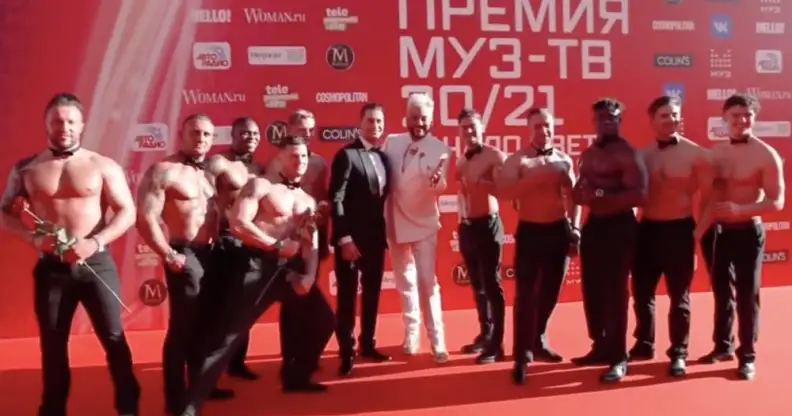Russian music awards faces ‘gay propaganda’ probe over topless men and pretty dresses

Russian rapper Dava and Filipp Kirkorov surrounded by muscular men. (Screen capture via Instagram/@fkirkorov)
A Russian music award ceremony is being investigated for “gay propaganda” by the state after two musicians arrived surrounded by buff, oiled men.
The Muz-TV awards, one of the country’s biggest showbiz events, caused controversy in the deeply homophobic nation on Friday (4 June).
Rapper Dava and singer Filipp Kirkorov arrived in a white convertible, wearing matching tailcoats and trailed by a gaggle of topless men, in what viewers reportedly likened to a wedding ceremony.
Elsewhere, beauty blogger Igor Sinyak graced the red carpet of the Megasport Arena in Moscow in a voluminous black down and TikTok legend Danya Milokhin walked in a half-dress, half-tuxedo.
Pearl-clutching viewers were reportedly taken aback by the attendees, with the Roskomnadzor, the state telecommunications watchdog, now taking aim at the ceremony.
View this post on Instagram
“Roskomnadzor will analyze the Muz-TV awards broadcast for violations of Russia’s current legislation, including in the realm of protecting children from information that harms their health and development,” the regulator told state-run RIA Novosti news agency on Tuesday (8 June).
The Roskomnadzor carries immense influence in Russia, with the Kremlin wielding the agency’s wide-ranging powers to limit what content citizens can see while throttling tech companies and the media with fines and bans.
View this post on Instagram
It has dubbed LGBT+ short films as harmful to children, shut down vital HIV health websites and removed queer social media pages, among other repeated salvos against queer Russians.
In Russia, LGBT+ folk have faced off against a cruel and near-constant crackdown from leaders, lawmakers, law enforcement, the press and even the public for simply for daring to exist.
The so-called “gay propaganda law”, signed by Vladimir Putin in 2013 after the start of this third presidential term, has deeply alarmed LGBT+ rights activists, with the Human Rights Watch warning in 2018 that the legislation is directly harming and endangering queer youth.
“The law increases and enshrines stigma and prejudice,” an academic quoted in the group’s report said, “leading to discrimination and violence.”

